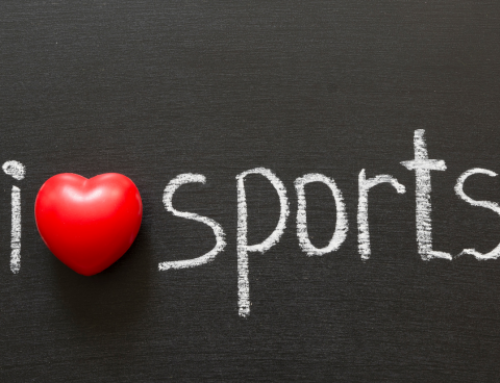3 Powerful Performance Psychology Techniques to Give You an Edge
The mental side of sports matters just as much as the physical.
How many times do you see athletically gifted individuals flame out because they lack the will or drive to reach their potential? The will to win is the fundamental difference that separates athletes of similar ability. That’s performance psychology.
Here are some performance psychology tips to get you ready for your next competition.
1. To keep yourself pumped, talk to yourself
Everyone has an internal monologue, and that monologue gets stronger in sports. Athletes tell themselves things like, “I need to make this shot” or “three laps to go” or something along those lines throughout every game or match. Talking to yourself in general can improve your perception and memory.
RELATED: 2 Sport Psychology Tips to Improve Your Visualization Skills
Now, many people observe that it’s important to keep self-talk positive, and that is true. But it is not the most important thing.
The most important thing you can do is to use self-talk to keep yourself pumped. Suppose your team is up by a lot with only a few minutes left, and you tell yourself, “Only five more minutes until I can get out and take a shower.”
A thought like that can encourage you to relax and not take the game as seriously. And suppose the opposing team manages to tie the game? You will be far more deflated because you have to push yourself once again. As C.S. Lewis observed, men are at their weakest when they think they have overcome a challenge, only to suddenly face an additional unexpected one.
Instead, use language that keeps you pumped. Don’t think “This game is over.” Think, “Finish them.” That will keep your focus up and motivation high.
RELATED: 5 Pillars of Mental Toughness
2. Have a Routine
Professional athletes have routines for everything. Even something as simple as shooting a free throw can engender all sorts of elaborate rituals before a player steps up to take the shot.
Why are routines so important? Because they allow control. Sports are exciting because of the uncertainty before every game. But that same uncertainty can stress an athlete out. Routines allow you to reassert control at key points in the game, calming you and helping you play to your potential.
The time for routine is before the game begins. Think of something that is easy and takes little time, and associate that routine with preparation and strength. Even a simple gesture like moving your arms in a certain motion is enough of a routine to strengthen your brain.
RELATED: Breathing Techniques to Improve Recovery
3. Breathe
We’ve all been told throughout our lives to take a deep breath to calm down when we are stressed. As the American Institute of Stress explains, deep breathing increases blood flow to the brain and stimulates nerves, which promote calmness.
But different types of breathing can produce different psychological effects. Just as deep, slow breathing can calm you down, sharp, rapid breathing can energize and pump you up. If you are facing a tough stretch, intense breathing will give you the energy you need for another push.
These different types of breathing affect not only your own psychology, but also your opponent’s. If you can breathe normally while your opponent is gasping for air, your calmness can psych your opponent out.
There are many more things an athlete can do to gain a psychological edge over an opponent. Some play loud music. Others repeatedly say keywords like “hustle,” which gets their mind going. Even just the process of moving gets the blood going and your mind ready.
[cf]skyword_tracking_tag[/cf]RECOMMENDED FOR YOU
MOST POPULAR
3 Powerful Performance Psychology Techniques to Give You an Edge
The mental side of sports matters just as much as the physical.
How many times do you see athletically gifted individuals flame out because they lack the will or drive to reach their potential? The will to win is the fundamental difference that separates athletes of similar ability. That’s performance psychology.
Here are some performance psychology tips to get you ready for your next competition.
1. To keep yourself pumped, talk to yourself
Everyone has an internal monologue, and that monologue gets stronger in sports. Athletes tell themselves things like, “I need to make this shot” or “three laps to go” or something along those lines throughout every game or match. Talking to yourself in general can improve your perception and memory.
RELATED: 2 Sport Psychology Tips to Improve Your Visualization Skills
Now, many people observe that it’s important to keep self-talk positive, and that is true. But it is not the most important thing.
The most important thing you can do is to use self-talk to keep yourself pumped. Suppose your team is up by a lot with only a few minutes left, and you tell yourself, “Only five more minutes until I can get out and take a shower.”
A thought like that can encourage you to relax and not take the game as seriously. And suppose the opposing team manages to tie the game? You will be far more deflated because you have to push yourself once again. As C.S. Lewis observed, men are at their weakest when they think they have overcome a challenge, only to suddenly face an additional unexpected one.
Instead, use language that keeps you pumped. Don’t think “This game is over.” Think, “Finish them.” That will keep your focus up and motivation high.
RELATED: 5 Pillars of Mental Toughness
2. Have a Routine
Professional athletes have routines for everything. Even something as simple as shooting a free throw can engender all sorts of elaborate rituals before a player steps up to take the shot.
Why are routines so important? Because they allow control. Sports are exciting because of the uncertainty before every game. But that same uncertainty can stress an athlete out. Routines allow you to reassert control at key points in the game, calming you and helping you play to your potential.
The time for routine is before the game begins. Think of something that is easy and takes little time, and associate that routine with preparation and strength. Even a simple gesture like moving your arms in a certain motion is enough of a routine to strengthen your brain.
RELATED: Breathing Techniques to Improve Recovery
3. Breathe
We’ve all been told throughout our lives to take a deep breath to calm down when we are stressed. As the American Institute of Stress explains, deep breathing increases blood flow to the brain and stimulates nerves, which promote calmness.
But different types of breathing can produce different psychological effects. Just as deep, slow breathing can calm you down, sharp, rapid breathing can energize and pump you up. If you are facing a tough stretch, intense breathing will give you the energy you need for another push.
These different types of breathing affect not only your own psychology, but also your opponent’s. If you can breathe normally while your opponent is gasping for air, your calmness can psych your opponent out.
There are many more things an athlete can do to gain a psychological edge over an opponent. Some play loud music. Others repeatedly say keywords like “hustle,” which gets their mind going. Even just the process of moving gets the blood going and your mind ready.
[cf]skyword_tracking_tag[/cf]













